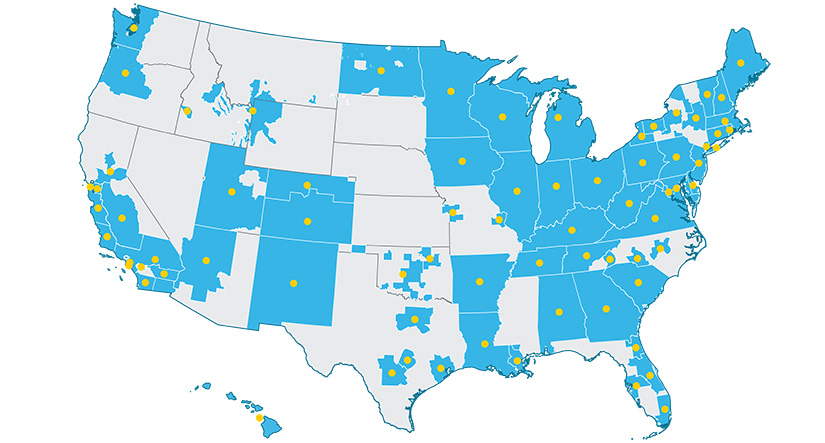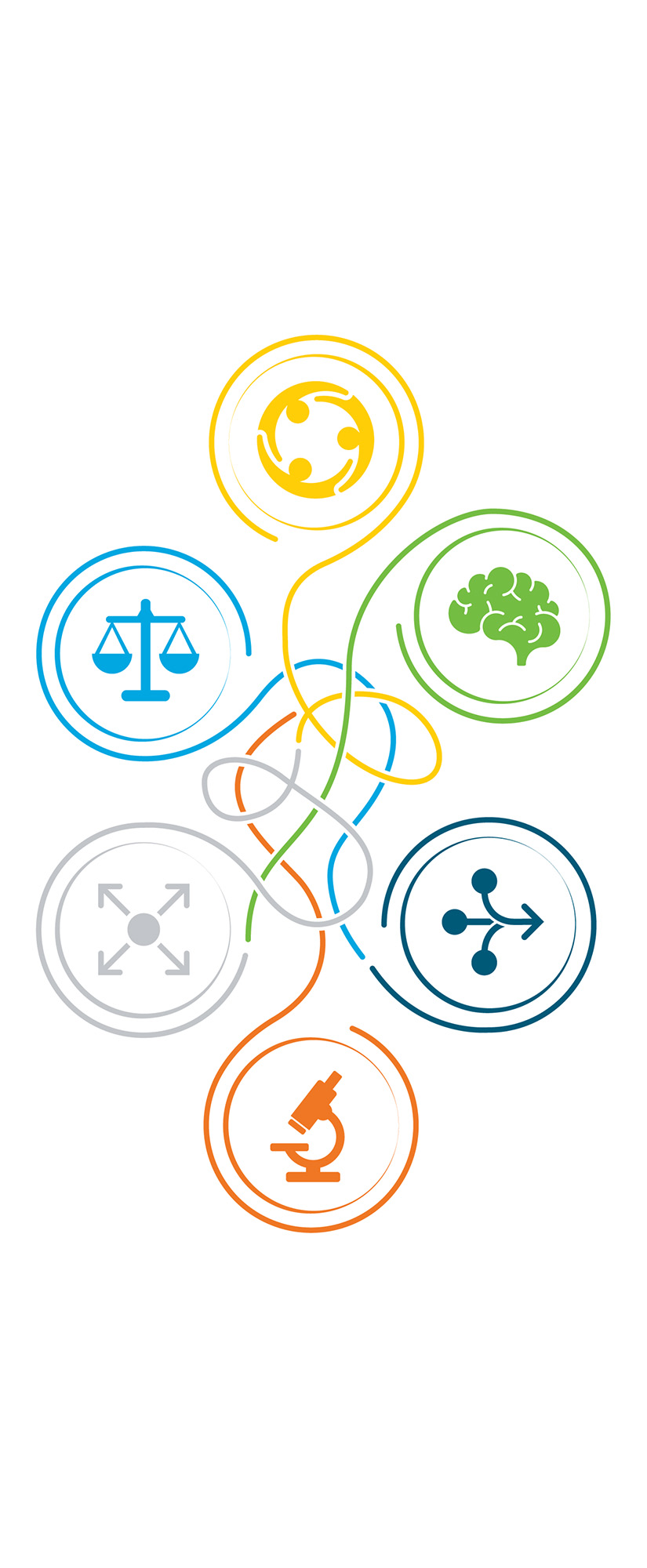Clean Cities Thrives for 30 Years as Model for Collaborative Technology Deployment

A long-standing federal effort to decarbonize transportation proves how advanced technologies can make meaningful, real-world impacts by intertwining national goals and initiatives with local, community-based actions.
The innovative model built over the past 30 years by the Clean Cities Coalition Network demonstrates how federal programs can successfully deploy new technologies through long-term, multidirectional stakeholder engagement. Clean Cities coalitions implement alternative fuel and advanced transportation projects throughout the United States. A new National Renewable Energy Laboratory (NREL) report, "Clean Cities: A Model of Collaborative Technology Innovation Built Over 30 Years," tells the story of Clean Cities, documenting how and why the success of Clean Cities can serve as a model for other federal efforts.
Clean Cities is a collaboration of more than 75 coalitions covering nearly every state and 85% of the U.S. population. Coalitions boost the country's economic vitality, energy security, and quality of life by advancing the deployment of affordable, efficient, and clean transportation fuels and technologies. As the technology deployment arm of the U.S. Department of Energy's (DOE's) Vehicle Technologies Office, Clean Cities operates within a framework of collaborative governance and leverages expertise from federal agencies, national laboratories—including NREL—and coalitions. Coalitions provide resources and technical guidance to local decision makers and fleets implementing alternative and renewable fuels, electric vehicles, idle-reduction measures, fuel economy improvements, new mobility choices, and emerging transportation technologies.
"Clean Cities has thrived for 30 years in part because it is so collaborative and leverages relationships among public, civic society, and private sector entities at the local, state, and national level," said Patricia Romero-Lankao, a senior research scientist and interdisciplinary sociologist at NREL who co-authored the report. "These collaborations are highly intensive while still preserving the autonomy of the individual coalitions."
In addition to rigorous collaboration, the institutional structure of Clean Cities contributes to its long-term success by being stable yet nimble, enabling continuous adjustment and adaptation. Each coalition receives national-level support but remains semi-autonomous and makes independent strategic and programmatic decisions in response to local needs and market shifts.
"Coalition staff are typically hired by and from the community they serve, so they have knowledge of the local area and experience with local transportation systems," Romero-Lankao said. "This helps foster local trust, allowing coalitions to build bridges between DOE, national labs, and transportation stakeholders. Coalitions can connect with networks and communities where national entities often cannot directly engage."
Building trust at the local level creates a sense of shared motivations and can help overcome competing local and national interests—a historic challenge for national-level environmental efforts, according to the report. Federal coordination also enhances the capacity of local stakeholders who otherwise would lack authority or access to initiate the types of large-scale collaborations that generate widespread impact.
Clean Cities engages in broad coordination and leverages internal expertise to advance high-level goals and strategies. Coalitions share local insights, data, and experiences with national laboratories and DOE to improve national data sets, resources, and technical response capabilities. NREL and other national laboratories proactively developed this community of collaboration over decades by creating opportunities for ongoing relationship building, including a peer-to-peer mentorship program, in-person workshops for coalition staff, virtual working groups, and outreach materials that support consistent messaging among all coalitions.


On the Ground
Help local decision makers and fleets implement alternative and renewable fuels,
idle-reduction measures, fuel economy improvements, new mobility choices, and emerging
transportation technologies.

Inform Research
Foster multilateral, collaborative relationships with coalitions providing lab staff
with community-based insights to help ensure their research addresses real-world transportation
needs and priorities.

Subject Matter Experts
Connect coalitions with experts and objective problem-solving support to help stakeholders
overcome obstacles to deploying advanced transportation technologies and alternative
fuels.

Deployment
Remain flexible and adaptive to emerging technologies, circumstances, and needs.
Empower coalitions to customize approaches based on local contexts and priorities
for deploying new transportation technologies.

Inform Funding Opportunity Announcements
Provide DOE with insights into on-the-ground stakeholder and community contexts to
help ensure research and funding align with real-world needs.

Energy Equity
Weave energy and environmental justice considerations throughout to develop clean
transportation solutions that meet community-identified needs and increase mobility
equity in historically underserved and overburdened communities.
The Clean Cities process involves multiple intertwined facets that inform and build on one another through iterative feedback loops. Image by Elizabeth Stone, NREL
"The level of cooperation Clean Cities has created among national labs and between coalitions is unique in the federal government," said Margo Melendez, a transportation technology deployment group manager at NREL. "We all share the same goals and have an essential role to play, so we are collaborating instead of competing. This allows Clean Cities to make a much bigger impact than if we were all acting on our own."
A project that raised awareness and acceptance of electric vehicles (EVs) across the Midwest exemplifies how this level of collaboration enhances impact. Leaders from Clean Cities coalitions in seven states (Illinois, Indiana, Michigan, Minnesota, North Dakota, Ohio, and Wisconsin) joined forces to form Midwest Electric Vehicle Opportunities: Learning, eVents, Experience (Midwest EVOLVE), which reached more than 290,000 people and helped change the narrative about EVs in the Midwest. Survey data collected by the project partners showed that 75% of people reached by Midwest EVOLVE took the next step of visiting a dealership or talking to someone else to consider EVs more closely. Twenty-two percent of respondents said they ultimately purchased or leased an EV.
"Clean Cities is required by federal law to be technology and fuel neutral, meaning it can't advocate for a specific technology or fuel," said Wendy Dafoe, a Clean Cities senior project leader at NREL. "This helps coalitions remain relevant wherever they are located, because they create solutions that make sense for their local communities."
The collaborative framework, nimble structure, and iterative feedback mechanisms demonstrate the power of Clean Cities' long-term collaborative governance for initiatives aiming to impact local communities at a national scale. Clean Cities centers the knowledge, expertise, and vision of local communities, making it a model for how to design community-centered solutions that align national objectives with local goals and visions.
The long-standing success of Clean Cities as a technology deployment model is also being leveraged by more recent federal efforts, including Clean Energy to Communities (C2C), a new DOE program that helps local governments, tribes, electric utilities, and community-based organizations set and meet their clean energy goals. C2C leverages the latest set of advanced capabilities from national laboratories, including NREL, as well as community engagement and peer-learning strategies. Under NREL's leadership, Clean Cities coalitions will support communities participating in C2C offerings by leveraging the transportation technology deployment and partnership-building expertise within the Clean Cities Coalition Network.
Learn more about NREL's sustainable transportation and mobility research. And sign up for NREL's quarterly transportation and mobility research newsletter, Sustainable Mobility Matters, to get the latest news.

